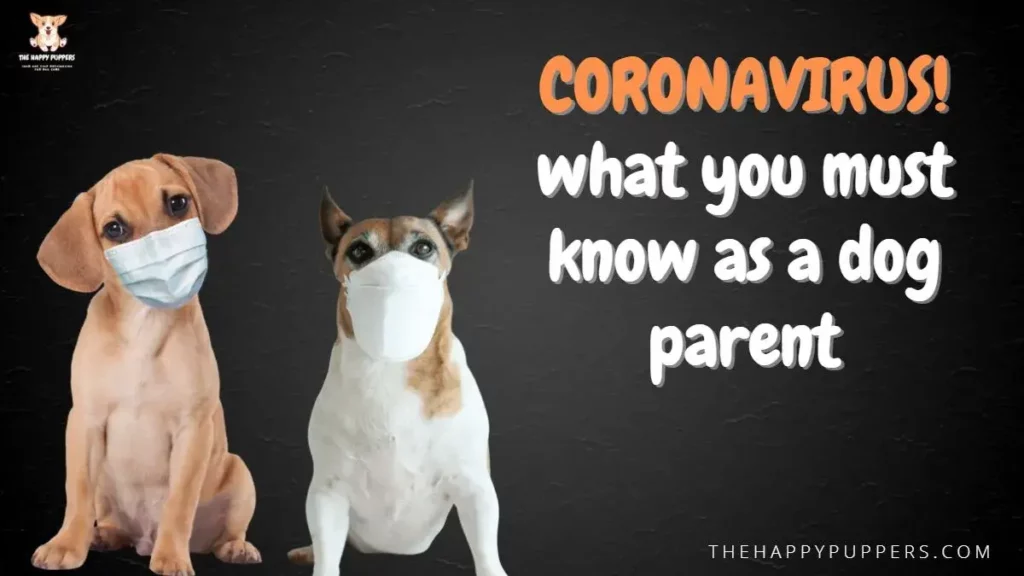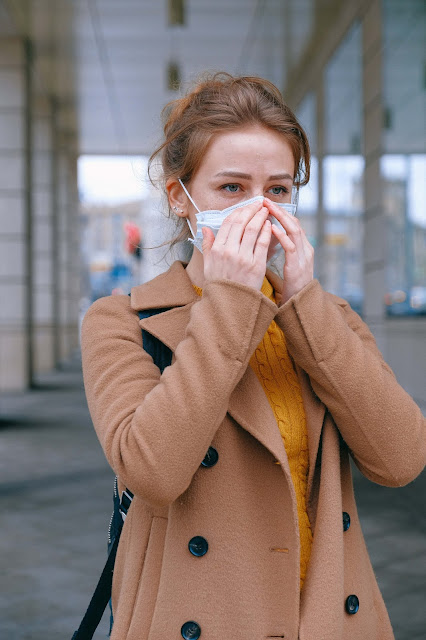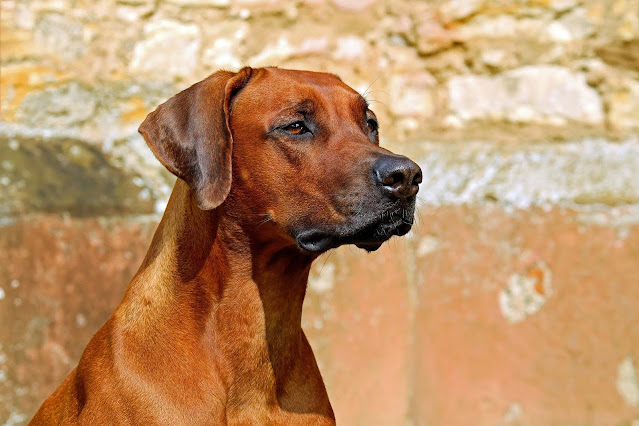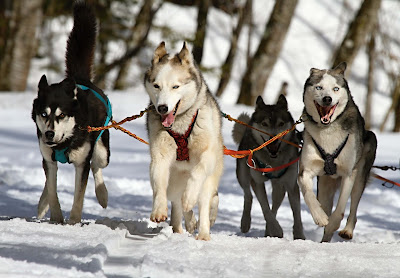Topics covered in this blog post
Coronavirus! What you need to know as a dog guardian!
What is Coronavirus?
Coronaviruses are positive-stranded, spherical, enveloped, non-segmented RNA viruses. It has a diameter of 125nm. In the human body, it binds to the ACE2 receptor present on the alveoli of the lungs. Upon infection/entry, it hijacks the human cell machinery to make a complete virus particle, killing the host cell in the process.
The name Coronavirus is derived from the crown-like spikes which are present on the surface of the virus (in Latin, corona translates to ‘crown’).
The novel Coronavirus has 2 names:
- COVID-19
- SARS-CoV-2
Other Coronaviruses which have been faced by the human race are SARS (severe acute respiratory syndrome) Coronavirus (outbreak observed in 2003) and MERS (Middle eastern respiratory syndrome) Coronavirus (outbreak observed in 2013-14).
The 2019 novel Coronavirus, is believed to have originated in bats and has been transmitted to humans via an intermediate host animal.
The incubation period (the time duration needed by the virus to grow in the body during which no signs or symptoms of the disease are observed ) of this virus is 4 to 14 days in humans.
The most common symptoms of this disease (in humans) are
- fever
- dry cough
- muscle ache
- fatigue
The less common symptoms (in humans) are
- headache
- Coughing up blood
- Diarrhoea
The disease usually transmits via direct contact with an infected person (via droplets containing virus particles)
Let’s come to the main question:
Can dogs be affected by Coronavirus?
Currently, according to the WHO’s Myth Buster page, there is no scientific evidence implicating that dogs or cats can get affected by the Coronavirus.
The dog tested positive for the virus after living with his guardians who were infected by the said virus. As per a report from the World Organization of Animal Health, the dog in question did not show signs or symptoms of being infected by the Coronavirus. There is currently no scientific support indicating that dogs can get affected by the Coronavirus or that they can act as vectors (transmitting agents) for the disease.
What should I as a dog guardian do?
Maintain regular hygiene as you normally would.
In case a person is affected or is suspecting himself or herself to be affected, it is advisable to hand over the care of their dog to an uninfected person just like they would if they have any disease.
In case the infected person must care for their dog, it is recommended to wear a face mask and wash their hands before and after coming in contact with their dogs.
If your dog usually stays at home, does not come in contact with other dogs and no one at your home is infected by Coronavirus, you don’t have anything to worry about. The chances of your dog getting infected are very unlikely.
What to do if one suspects their dog of being infected by the Coronavirus?
Currently, public services and Veterinary health are working together using a one health approach to share all information and conduct a risk assessment if a COVID-19 infected person is reported to be in contact with dogs.
If a decision is taken to conduct a risk assessment test, a real-time reverse transcriptase- polymerase chain reaction (RRT-PCR/qRT-PCR) test is conducted on oral, nasal as well as fecal samples of dogs suspected of being infected with the virus.
What is the RRT-PCR/qRT-PCR test?
Just like we humans have DNA which possesses our genetic code, similarly Coronaviruses have RNA which contains their genetic code. Viruses replicate in the human body by converting their RNA into DNA by the use of an enzyme (protein which speeds up a chemical reaction) called reverse transcriptase. Depending on the virus, the newly made DNA may get integrated into the human genome. The novel Coronavirus does not convert its RNA into DNA and initiates protein synthesis upon entry into the host cell to form new virus particles.
In the qRT-PCR test, reverse transcriptase is used to convert the viral DNA which may be present in the blood to DNA and is then quantified for the purpose of identification.
Is any vaccination available which can protect my dog from getting infected by Coronavirus?
Unfortunately, at the moment there is no vaccine available for dogs which can provide immunity against Coronavirus. As per the estimation of the WHO, a vaccine for humans against Coronavirus may be available by 12 to 18 months.
Should I make my dog wear a face mask when I take him/her out in public?
The masks which are available for dogs in the market will not protect your dog from getting infected by diseases which are transmitted via bodily fluids. What you can do instead is make sure that your pup’s vaccination is up to date, especially the vaccines against respiratory diseases like canine influenza, Bordetella and parainfluenza.
What to do if I am ill (suspected or suffering from Coronavirus) and my dog needs immediate vet care?
Even though dogs have not been identified as vectors or being vulnerable to the disease, it is still better to maintain precautions as much as possible. In the case of the unfortunate scenario, where you might be infected and your pup is in need of emergency care, contact the emergency pet health services and explain your situation to them. They may be able to provide you with some support by taking your dog from the car and into the hospital without you needing to go in. Following this, they may discuss the symptoms, diagnosis as well as the treatment plan of your dog over the phone.
Alternatively, they might discuss the entire situation on the phone first before taking the decision of whether your dog needs to be admitted or not. In case any over the counter medication is advised or if you have the mediation lying around from any previous suffering, you may not have to take your dog to the hospital at all.
Conclusion:
Now that you know what you should do and how to keep your pup protected, make sure you follow all instructions to the teeth and keep your pup’s vaccination up to date.
What are you doing to keep the COVID-19 at bay? Let me know in the comment section below. If you have any specific questions make sure to put them down too. I will do my best to answer on the basis of available scientific research.
Furthermore, if you are concerned with your dogs not getting the proper amount of exercise due to the quarantine, you can check out the next post which will focus on making an indoor dog activity area.
Or
You can check out the following video which describes how to set up the activity area and get your dog tired.
Finally maintain proper hygiene and stay safe.
PS: If you like the article, please share it with your friends so that more dog guardians are aware of what they need to do in this difficult time and situation. Also, don’t forget to leave a comment!







47 Comments
Although I do not have any pet as off now but my best frend who lives in Bangalore has a dog and recently in his particular area Corona has been detected. I will share it with him as it will be helpful for him.
I didn't even think that this virus could infect my pets! I will be mindful of this.
Thank you. The aim is to get the information out to as many people as possible 🙂 Stay safe.
At the moment there is no scientific evidence supporting it. However, it is always better to be careful. Stay safe.
The case of the one dog that had it is very interesting. I hope COVID doesn't mutatie into a strain that can be carried by pets.
This is a crazy time, that's for sure. I don't have dogs, just cats and we've just been working on making sure everyone washes their hands.
This virus is making all of us crazy. What else can we do except wait it out
If I had pets, I too would be concerned. I think dogs should be fine as long as the owner does not have the virus
In the rescue world we're seeing owner surrenders right now. People are being laid off and can't afford to keep their furkids. It's a scary time.
It is crazy times for sure right now! My dog is mainly inside anways and not around a lot of people other than my family. We are just staying home as much as possible right now.
I don't have dogs but we keep our cats inside so as long as we stay home and don't get it they will be fine. Thanks for the info.
This is so helpful when there is so much panic around. Since there has been no evidence that pets could get infected, people might ignore some of the points mentioned in your post!
I would think that if a dog could catch a cold, it’s more than likely that it could catch the coronavirus as well. Be safe either way.
I don’t have any pets but it is good that you mentioned it. Pets can be lost in this problem and I am glad you spoke about it. Great job.
I'm so glad this virus can't be passed to animals. I have 2 fur babies and I really don't want them to get sick.
We are so concerned about humans and COVID 19 that I have never even given a thought if it would effect pets. Its interesting to learn about this.
Interesting! I didn't really consider it being transferable between humans and dogs. That whole concept is so brand new to me. Thanks for the clarification!
I'm going to keep my dog away from the dog park.
I was thinking about this the other days, could animals get the virus from other animals and/or humans? This gave me new knowledge about the virus.
Very conceptual and scientifically compiled article on COVID-19/ SARS-CoV-2 pandemic and its plausible effects on dogs.
Great article! My family and I are doing everything we can to stay safe til this passes.
Candy Rachelle
Keeping Up With Candy
http://www.keepingupwithcandy.com
Thank you. That's good to know 🙂 Hope this passes soon.
Thank you so much for your wonderful comment 🙂
Happy to help 🙂
Any place with a lot of humans or animals is not a good idea.
Happy to help 🙂
Happy to help. Stay safe 🙂
I am thankful for that too. I am keeping a close eye on animal research right now. If anything new comes up, I will let you know 🙂
Happy to help :)Stay safe 🙂
Yep..its true. There have been 2 documented cases of dogs with coronavirus, but it did not affect them, just took residency in their body. Probably in a dormant type state. Anyways, stay safe 🙂
As long as people don't submit their dogs in shelter in the fear of their dogs transmitting coronavirus, I am happy. Problem here is that people without any scientific evidence are assuming their dogs will infect them and are submitting their dogs into shelters. 🙁
Happy to help :).
It is so sad. I just hope this puts their mind to rest. Why do people make assumptions? If that was their own kid who could have transmitted the virus, would they throw their kids out too?? 🙁
I hope so too. Fingers crossed
Yep. That's the hope right now. Stay safe
That is a great thing to do and stay indoors as much possible, Stay safe 🙂
and hope that it goes away soon. Stay indoors. Stay safe 🙂
That is the best thing to do right now. Stsy indoors and get lots of cuddles from your pupper. Stay safe 🙂
Thanks for the great info!
very good post, i actually love this website, carry on it
This web site is really a walk-through for all of the info you wanted about this and didn’t know who to ask. Glimpse here, and you’ll definitely discover it.
so much wonderful info on here, : D.
he blog was how do i say it… relevant, finally something that helped me. Thanks
Thank you for every other magnificent post. Where else may anybody get that kind of info in such an ideal means of writing? I’ve a presentation next week, and I’m at the look for such information.
Hi my friend! I wish to say that this post is awesome, nice written and include almost all vital infos. I’d like to peer more posts like this.
Hello. impressive job. I did not anticipate this. This is a great story. Thanks!
Hello! I could have sworn I’ve been to this blog before but after browsing through some of the post I realized it’s new to me. Anyways, I’m definitely happy I found it and I’ll be book-marking and checking back frequently!